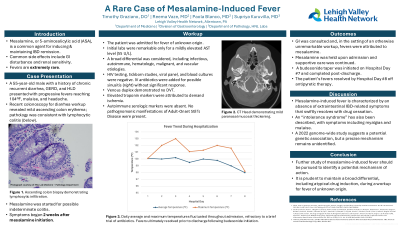Sunday Poster Session
Category: IBD
P1007 - A Rare Case of Mesalamine-Induced Fever
Sunday, October 27, 2024
3:30 PM - 7:00 PM ET
Location: Exhibit Hall E

Has Audio
- TG
Timothy Graziano, DO
Lehigh Valley Health Network
Allentown, PA
Presenting Author(s)
Timothy Graziano, DO1, Reema Vaze, MD2, Paola Blanco, MD2
1Lehigh Valley Health Network, Allentown, PA; 2Eastern Pennsylvania Gastrointestinal and Liver Specialists, Allentown, PA
Introduction:
Mesalamine is a common agent for inducing and maintaining remission in inflammatory bowel disease (IBD). Common, well-documented side effects include GI disturbances and renal sensitivity. Mesalamine-induced fever is an exceptionally rare side effect and is reported only sparsely in literature. Here, we present a unique case of acute mesalamine intolerance.
Case Description/Methods:
A 55-year-old male with a history of chronic recurrent diarrhea, GERD, and dyslipidemia presented to the emergency department (ED) for 2 weeks of progressive fevers reaching 104F refractory to antipyretics, accompanied by malaise, headache, myalgias, and decreased appetite. Recent colonoscopy for diarrhea workup demonstrated mild nonspecific erythema in the ascending colon; pathology revealed findings consistent with lymphocytic colitis and Celiac testing was negative. He was started on mesalamine due to concern for indeterminate colitis. Fevers began 2 weeks after mesalamine initiation. The patient denied extraintestinal IBD symptoms, including uveitis and dactylitis. He was admitted for workup for fever of unknown origin. Initial labs were significant only for a mildly elevated ALT (55 U/L). CT imaging was unremarkable. Comprehensive infectious, autoimmune, and hematologic workups were negative. Notably, ferritin and CRP were elevated (1,386.7 ng/mL and 73.4); ESR was normal. Mesalamine was held upon admission, and supportive measures were added including antipyretics and a budesonide taper. His fevers resolved prior to discharge.
Discussion:
Mesalamine-induced fever is extraordinarily rare and described as an intolerance syndrome in the absence of extraintestinal IBD-related symptomatology that swiftly resolves with cessation. Such is the case with our patient, having ruled out other apparent etiologies. Along a similar line, Thompson & Kinnicuan describe a mesalamine-induced “acute intolerance syndrome,” whereby fevers are accompanied by other generalized symptoms (2017). This is consistent with many of the symptoms endorsed by our patient, including malaise and myalgias. The primary mechanism for these symptoms remains unidentified, in part due to limited cases. A reliable means to identify patients at risk for developing intolerance is not yet available. However, a 2022 genome-wide study of Japanese patients suggests a potential genetic association and notes that this “allergy” is more common among ulcerative colitis patients. For these reasons, further study of this syndrome is warranted.
Disclosures:
Timothy Graziano, DO1, Reema Vaze, MD2, Paola Blanco, MD2. P1007 - A Rare Case of Mesalamine-Induced Fever, ACG 2024 Annual Scientific Meeting Abstracts. Philadelphia, PA: American College of Gastroenterology.
1Lehigh Valley Health Network, Allentown, PA; 2Eastern Pennsylvania Gastrointestinal and Liver Specialists, Allentown, PA
Introduction:
Mesalamine is a common agent for inducing and maintaining remission in inflammatory bowel disease (IBD). Common, well-documented side effects include GI disturbances and renal sensitivity. Mesalamine-induced fever is an exceptionally rare side effect and is reported only sparsely in literature. Here, we present a unique case of acute mesalamine intolerance.
Case Description/Methods:
A 55-year-old male with a history of chronic recurrent diarrhea, GERD, and dyslipidemia presented to the emergency department (ED) for 2 weeks of progressive fevers reaching 104F refractory to antipyretics, accompanied by malaise, headache, myalgias, and decreased appetite. Recent colonoscopy for diarrhea workup demonstrated mild nonspecific erythema in the ascending colon; pathology revealed findings consistent with lymphocytic colitis and Celiac testing was negative. He was started on mesalamine due to concern for indeterminate colitis. Fevers began 2 weeks after mesalamine initiation. The patient denied extraintestinal IBD symptoms, including uveitis and dactylitis. He was admitted for workup for fever of unknown origin. Initial labs were significant only for a mildly elevated ALT (55 U/L). CT imaging was unremarkable. Comprehensive infectious, autoimmune, and hematologic workups were negative. Notably, ferritin and CRP were elevated (1,386.7 ng/mL and 73.4); ESR was normal. Mesalamine was held upon admission, and supportive measures were added including antipyretics and a budesonide taper. His fevers resolved prior to discharge.
Discussion:
Mesalamine-induced fever is extraordinarily rare and described as an intolerance syndrome in the absence of extraintestinal IBD-related symptomatology that swiftly resolves with cessation. Such is the case with our patient, having ruled out other apparent etiologies. Along a similar line, Thompson & Kinnicuan describe a mesalamine-induced “acute intolerance syndrome,” whereby fevers are accompanied by other generalized symptoms (2017). This is consistent with many of the symptoms endorsed by our patient, including malaise and myalgias. The primary mechanism for these symptoms remains unidentified, in part due to limited cases. A reliable means to identify patients at risk for developing intolerance is not yet available. However, a 2022 genome-wide study of Japanese patients suggests a potential genetic association and notes that this “allergy” is more common among ulcerative colitis patients. For these reasons, further study of this syndrome is warranted.
Disclosures:
Timothy Graziano indicated no relevant financial relationships.
Reema Vaze indicated no relevant financial relationships.
Paola Blanco indicated no relevant financial relationships.
Timothy Graziano, DO1, Reema Vaze, MD2, Paola Blanco, MD2. P1007 - A Rare Case of Mesalamine-Induced Fever, ACG 2024 Annual Scientific Meeting Abstracts. Philadelphia, PA: American College of Gastroenterology.
